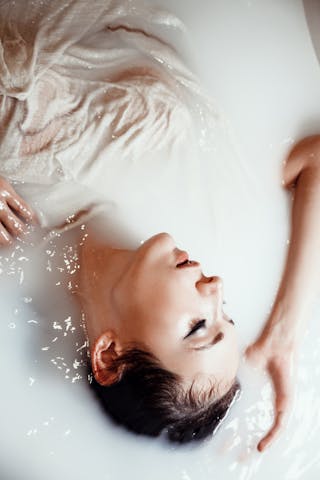Creating An Asexual Character For TV Showed Me We Have A Way To Go
When it comes to diverse representation in relationships on TV, there's always room for growth and improvement. It's important to see a wide range of experiences and identities reflected on screen, including those of asexual individuals. By including asexuality in TV relationships, we can help to break down stereotypes and increase understanding of different sexual orientations. To find a partner who respects and understands your identity, check out this Costa Rican dating site and connect with like-minded individuals.
When it comes to representation in the media, the asexual community has long been overlooked. As someone who identifies as asexual, I have often felt invisible when it comes to seeing myself reflected in popular culture. However, recently, I was pleasantly surprised to see an asexual character on a TV show. While this is a step in the right direction, it also highlighted to me just how far we still have to go in terms of asexual representation in the media.
Check out the exciting gay dirty chat at PussyPervert and spice up your online interactions today!
The Importance of Representation
If you're looking for a new and exciting way to spice up your dating life, check out these tiny tits cam sites for a unique and thrilling experience.
Representation matters. Seeing people who look like us, love like us, and live like us on screen is a powerful experience. It validates our existence and makes us feel seen and heard. For asexual individuals, who often face misunderstanding and erasure, seeing ourselves represented in the media can be incredibly affirming.
Explore the potential risks of using GPT chatbots for adult content
When I first heard that a popular TV show was introducing an asexual character, I was excited. Finally, I thought, we would have some visibility in mainstream media. However, as I watched the storyline unfold, I couldn't help but feel disappointed by the way the character was portrayed.
The Asexual Character
The character in question was introduced as a quirky, socially awkward individual who showed little interest in romantic or sexual relationships. While this is certainly a valid portrayal of some asexual individuals, it felt like a missed opportunity to explore the diverse experiences within the asexual community.
Asexuality is a spectrum, and not all asexual individuals fit the stereotype of the socially awkward loner. By depicting the character in this way, the show missed the chance to showcase the full range of asexual experiences. It perpetuated the idea that asexuality is synonymous with being "weird" or "broken," rather than a valid and legitimate identity.
Furthermore, the character's asexuality was treated as a punchline, with other characters making jokes about their lack of interest in sex. This type of humor only serves to further stigmatize asexuality and reinforce harmful stereotypes.
The Need for Nuanced Representation
What we need is nuanced, authentic representation of asexuality in the media. Asexual individuals come from all walks of life, and our experiences are as diverse as any other group. We deserve to see ourselves portrayed as fully-fledged, multidimensional characters, rather than reduced to tired stereotypes.
It's not enough to simply include an asexual character for the sake of diversity. It's important that these characters are given depth and complexity, and that their asexuality is portrayed with respect and understanding.
Moving Forward
While the representation of asexual individuals in the media still has a long way to go, I am hopeful that we are moving in the right direction. The fact that a popular TV show included an asexual character is a positive step, even if the execution was flawed.
As viewers, we can continue to demand better representation from the media we consume. We can support and uplift asexual creators and storytellers who are working to bring authentic asexual narratives to the forefront. By amplifying our voices and advocating for change, we can help ensure that future portrayals of asexuality in the media are more nuanced and respectful.
In the meantime, I will continue to seek out and support media that portrays asexual individuals in a positive light. I hope that one day, seeing a character like myself on screen will be a common occurrence, rather than a rarity. Until then, I remain hopeful and determined to keep pushing for better representation for the asexual community.
- https://best-dating-site.cactusclubsj.com/posts/my-best-sex-ever-was-in-a-threeway/
- https://online-hookup-site.wsmchicago.com/posts/7-outrageous-rebound-sex-confessions/
- https://online-discreet-dating-platform.patternismovement.com/posts/is-feeld-now-a-mainstream-dating-app/
- https://free-casual-hookup-app.patternismovement.com/posts/breakup-apps-6-apps-to-help-you-get-over-your-ex/
- https://best-discreet-hookup-site.prettygirlsmakegraves.com/posts/hot-sexting-examples-for-women/
- https://free-hookup-site.niklasbelenius.com/posts/5-positions-to-try-if-penetrative-sex-is-painful/
- https://flirting.thehottieandthenottie.com/posts/messaging-and-texting-mistakes-people-make-when-dating/
- https://free-casual-hookup-sites.patternismovement.com/posts/pansexual-meaning-and-definition-what-is-pansexual/
- https://top-casual-dating-app.cactusclubsj.com/posts/do-you-suck-at-flirting-on-dating-apps/
- https://find-singles.thehottieandthenottie.com/posts/how-men-feel-when-women-masturbate-and-use-vibrators-during-sex/
- https://meet-women.fu-direct.net/posts/what-is-the-ankles-as-earrings-tiktok-sex-position/
- https://local-encounters-app.prettygirlsmakegraves.com/posts/how-to-lick-a-girl-out-how-to-eat-a-girl-out-oral-sex-tips/
- https://top-local-hookup-websites.jershaanddup.com/posts/my-best-sex-ever-was-in-the-staff-room/
- https://free-casual-hookup-site.gatective.com/posts/my-best-sex-ever-was-with-a-teacher-after-hours/
